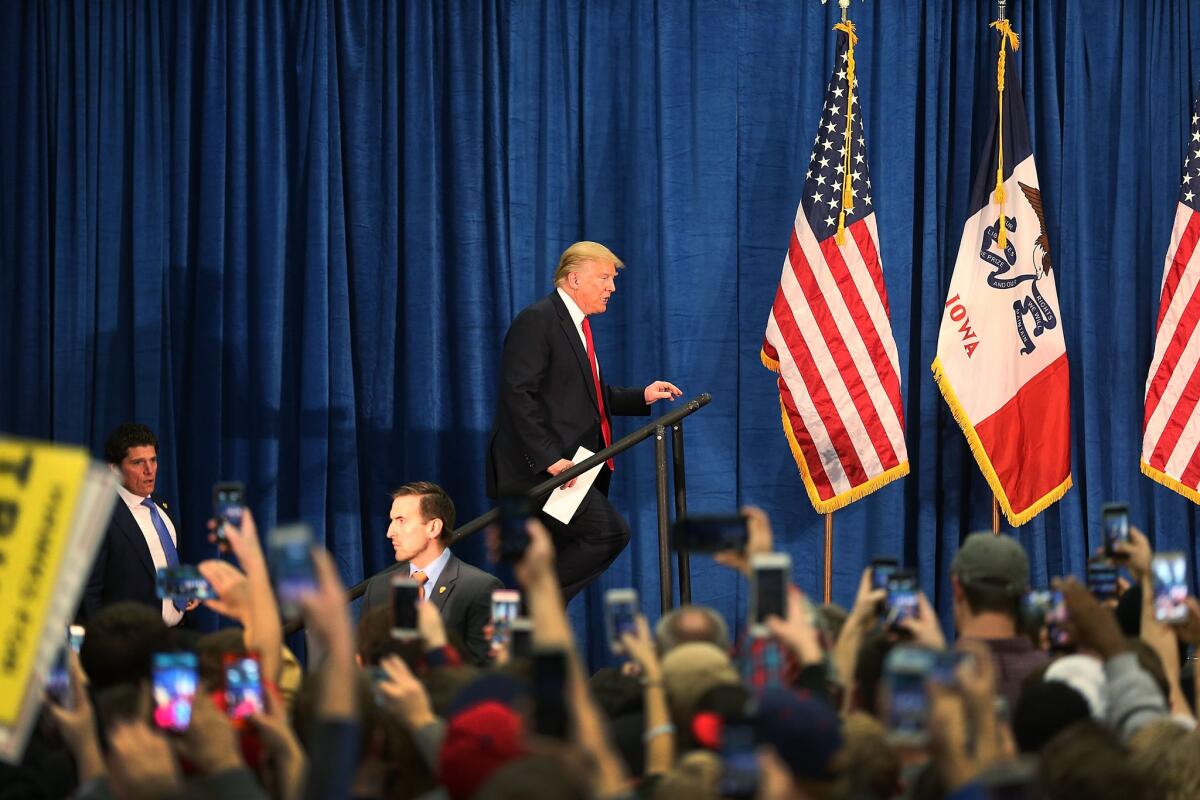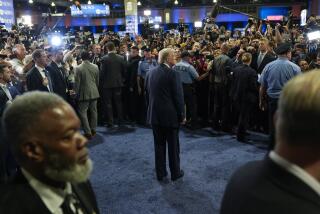Will a debate without Donald Trump still be all about Trump?

Republican presidential candidate Donald Trump walks onto the stage during a campaign event at the University of Iowa on Tuesday in Iowa City.
- Share via
Reporting from Washington — Only Donald Trump could make a debate without Donald Trump all about Donald Trump.
That’s one plausible scenario for what Thursday night’s GOP candidate face-off could turn into should the Republican presidential front-runner follow through on his vow to boycott the session because of a spat with Fox News. With Trump on the sidelines and an audience of the party’s base, the remaining candidates surely could see value in coming to the defense of moderator Megyn Kelly and the network whose prime-time lineup she anchors.
Of course, predictions about how Trump’s absence may play out are only as reliable as all of those forecasts over the last six months about the durability of his lead in the polls. A new Monmouth University survey showed Wednesday that Trump had vaulted into the lead in Iowa, with 30% support to Ted Cruz’s 23%.
TRAIL GUIDE: All the latest news on the 2016 presidential campaign >>
Among several ironies in the situation: Trump could have a bigger presence in the debate by his absence than by showing up. Except for a few zingers and dramatic exchanges in the six previous debates, he has more often been a muted presence -- particularly when the candidates talk policy. At the second debate, in Simi Valley, he logged the most talking time, but the vast majority of it came in the opening minutes when he was the center of discussion.
Trump has unquestionably been a ratings magnet for previous televised debates. The most recent one on Fox Business Network drew 11 million voters, the smallest audience so far, but still far beyond what the numbers were in previous election cycles and ahead of all but one network prime-time offering in the same time slot.
Any calculation on the Republican side about how to respond to his threatened absence begins with the question of what the debate audience would look like without him -- especially if he draws eyeballs elsewhere with a competing event.
If significant numbers of Trump supporters skip watching, candidates could be well-served by using the debate to draw sharper contrasts with him than they have been willing to do in the past.
Former Florida Gov. Jeb Bush and Ohio Gov. John Kasich have already been comfortable confronting Trump to his face in the most recent debates, inviting the billionaire’s scorn. But other candidates, including New Jersey Gov. Chris Christie and, to an extent, Sen. Marco Rubio of Florida, must balance the potential benefit of doing so against the perception that they are only willing to take on the bully when he’s not in the room.
Rubio issued a statement Wednesday that was a political twofer, taking on Trump and Cruz, the senator from Texas with whom he has clashed more directly.
“These kinds of theatrics by Ted Cruz and Donald Trump are an entertaining sideshow, but they have nothing to do with defeating Hillary Clinton,” Rubio said. “I’m going to stay focused on uniting the Republican party so we can defeat Hillary Clinton and turn the page on eight years of liberal failure.”
Will he have the choice? That depends on what Kelly and her fellow moderators do if Trump remains offstage. They could certainly force the issue on the candidates by asking about Trump’s absence.
Trump’s campaign manager took to MSNBC Wednesday to argue that Fox had an “obsession” with attacking Trump and tried to make the debate “about themselves.”
Trump has made demands of debate hosts before. He threatened to pull out of a CNBC debate in October unless the network agreed to limit the encounter to just two hours and let candidates make opening and closing statements.
And it was only four years ago that Trump was the target of a debate boycott. He had signed on in 2011 to moderate a forum hosted by Ion Television and the conservative publication Newsmax. Of the wide field of candidates, only Newt Gingrich and Rick Santorum agreed to appear.
Trump ultimately bowed out once it was clear the event would not go ahead. His face-saving explanation then?
“I am not willing to give up my right to run as an independent candidate.”
Follow @mikememoli for more 2016 campaign coverage.
MORE ON DONALD TRUMP
Donald Trump erotica novel is a huuuge hit on Amazon
Donald Trump helps rally Iowa’s Latinos – mostly to caucus against him
Donald Trump, hoping to slow Ted Cruz’s surge, makes inroads with evangelicals
More to Read
Get the L.A. Times Politics newsletter
Deeply reported insights into legislation, politics and policy from Sacramento, Washington and beyond. In your inbox three times per week.
You may occasionally receive promotional content from the Los Angeles Times.











